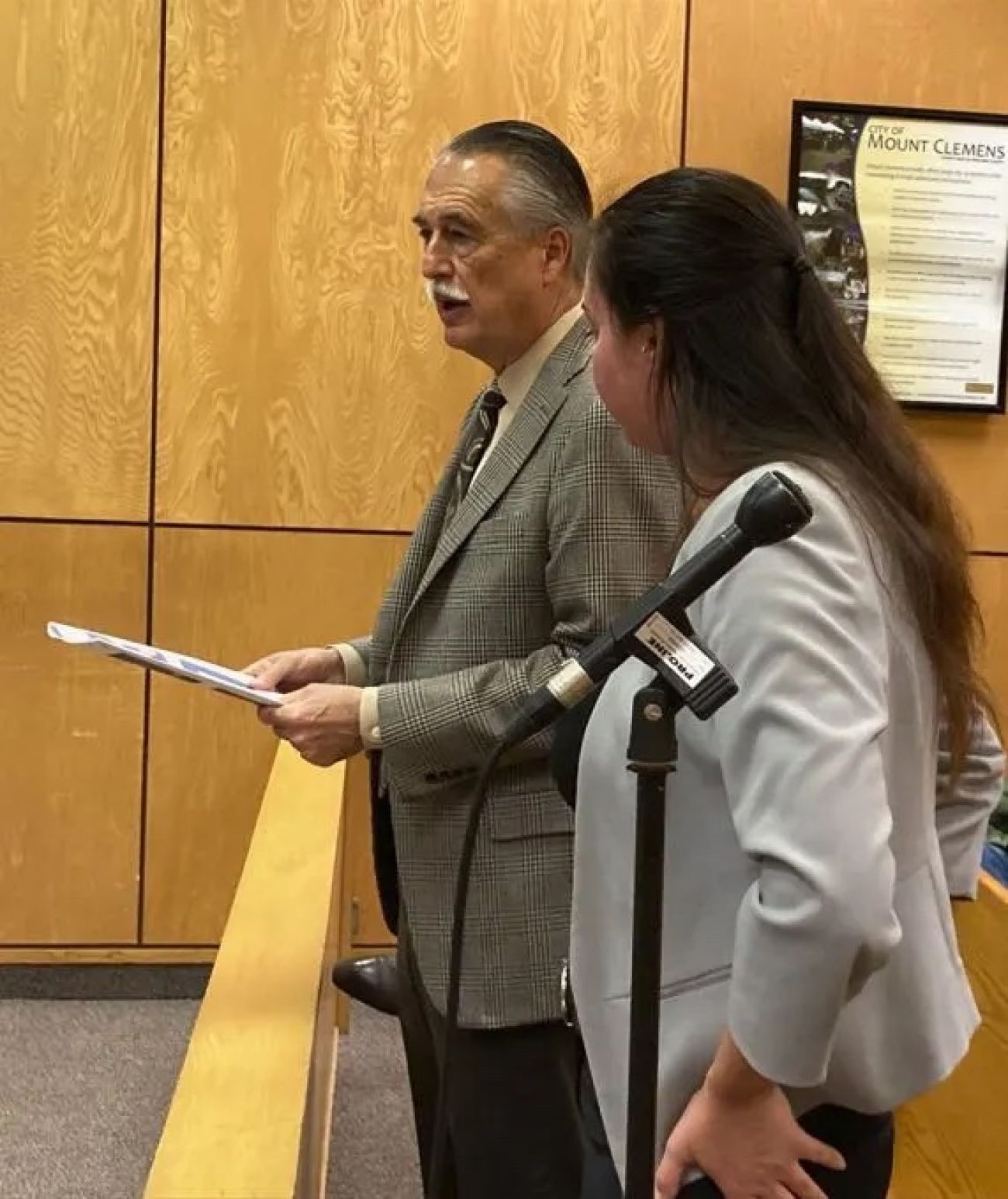Michigan developer gave $450K to lawmakers after $5M housing grant

- A real estate developer who received a $5 million earmark in the state budget has quickly become one of Michigan’s top political donors
- Jim George made more than $56,000 in contributions to legislators and their affiliated accounts before the earmark, and close to $450,000 since through a PAC run by a former lawmaker turned lobbyist
- Critics of earmarks point to the episode as an example of how the flow of money can undermine public trust
LANSING — Three weeks before Michigan Gov. Gretchen Whitmer signed last year’s state budget with a $5 million grant for an undefined Mount Clemens housing project, city commissioners held a special session to award the money to a company controlled by local developer Jim George.
In the months leading up to the vote, he had become a prolific political donor.
George’s company provided the agreement to Mount Clemens officials. He would buy a disused property on the edge of downtown, demolish the notorious, condemned hotel that stood on it and build apartments in its place.

The grant, which would flow to his firm without any competitive bidding, would be used to reimburse his costs.
The meeting took 15 minutes and the agreement received unanimous approval from the commission. It was the first time any information about the project or George’s plans had been publicly shared.
City and state officials, however, had known about the arrangement for months, and had worked with George to secure the grant, which was among more than $1.4 billion in taxpayer-funded earmarks added to the budget by lawmakers, many at the last minute with little public notice.
Related:
- For Michigan officials building an $80B budget, ‘boring is a good thing’
- Michigan senator, state at odds over financial disclosure law he helped write
- Gretchen Whitmer to moms: Paid leave, day care would help the Michigan economy
As the budget process unfolded, George made dozens of donations to lawmakers. And as he seeks additional tax breaks and grants, the pace of his contributions has increased, making him the fourth-largest individual political donor at the state level this election cycle.
State records show George has contributed nearly $500,000 to legislators over the course of 13 months, largely through a political action committee run by a lobbyist, according to a Bridge Michigan investigation.
The PAC, operated by former state Rep. Jason Sheppard, is legally allowed to give more money than George could have as an individual.
State and local officials who approved and redirected the $5 million earmark “to support workforce housing” say it could be a game changer for Mount Clemens. A fifth of the units are expected to be priced at 80% of area median income, while the rest will be market rate.
George did not respond to numerous messages seeking comment from Bridge.
Critics have questioned the process.
“We should not want our lawmakers collecting hundreds of thousands of dollars in campaign contributions to get millions in grants to political contributors,” said James Hohmann of the free market think tank Mackinac Center, which has long been critical of legislative earmarks directed toward individual districts.
“That isn't appropriate,” Hohman said. “We shouldn't want lawmakers to budget this way.”
‘A total win’
In Mount Clements, officials are championing the $5 million grant, which Mayor Laura Kropp called “a total win” and “transformative” for a 4-square mile city under budgetary strain and looking to rid itself of blight.
“The building had a reputation of being a problem in that community for a very long time and is a barrier to future development in that area,” said Sen. Kevin Hertel, D-St. Clair Shores, who represents Mount Clemens in the Legislature and co-sponsored the grant.
“Working with the city and others, it was extremely important to me that we get the grant dollars figured out to go to the city to get the building demolished.”
Hertel, who received $25,000 in donations from George, said “everything has been done in accordance with campaign finance law, and my priority is the city of Mount Clemens.”
In the months before the budget passed, George had given more than $57,000 to state lawmakers and their associated accounts.
Since then, he and a PAC he funded have contributed close to $450,000 more to legislators’ campaigns and leadership accounts, though there are some discrepancies between what the PAC reporting giving and what lawmakers received
Kropp told Bridge the city had little role in the process. She acknowledged she discussed with George what to do with the land and appealing for state funding, but said she considers the grant a state project.
“We're really just the fiduciary in this situation,” Kropps said, there to pass state dollars along to the businessman who had secured them.
City attorney Michael Murray told Macomb Daily, “the city’s sole responsibility is to act as an agent to disburse the grant.”
‘Taking on risk’
Michigan lawmakers – Republicans and Democrats alike — have used budget earmarks to pump billions of dollars into pet projects in recent years.
Several have proven controversial, and some have prompted criminal investigations, including a $25 million grant to a nonprofit run by a former aide of GOP House Speaker Jason Wentworth, and a $20 million grant awarded to a top Democratic donor subsequently accused of questionable spending.
Bob Schneider, senior researcher at the nonpartisan Citizens Research Council of Michigan, said the Mount Clemens grant illustrates the downsides of the earmarking process.
“We have lots of need for workforce housing … but was this chosen because this was the area where it was the highest need and, or was this earmark provided in order to get campaign contributions for lawmakers from this donor?” Schneider said.
With earmarks, there isn’t much weighing of other priorities, he noted.
“That's where the public loses out,” Schneider said. “There doesn't appear to have ever been an evaluation. How does this specific project stack up against a whole bunch of other places that have the same need?”
Hertel said he saw Mount Clemens as a unique situation and George as something of an angel investor.
“This is a challenging area to build in. We're not talking about incredibly high rates for rent. The profitability is very difficult to even look at,” Hertel said. “You need a unique somebody who knows what they're doing but also is willing to take on a really, really sizable risk.”
But in a presentation to Mount Clemens’ city commission late last year, George characterized the city as fertile ground as he pursued another $4.3 million in tax breaks and subsidies for the project.
"Our market study indicates a big demand," George said, according to The Macomb Daily. "We should be able to do four to five of these down here very easily."
When asked if the fate of the apartments had rested on securing an earmark, Hertel told Bridge his priority was to get the hotel demolished and “it’s not my job to know about the inner workings of the development.”
Kropp said the building has not yet been demolished as George holds out for additional funding opportunities from the Michigan State Housing Development Authority and other incentives, such as a brownfield tax credit.
She said that because the land wasn’t city-owned, they didn’t have any obligation to consider or request other plans for the development.
Donations flow
According to Kropp, George had initially approached her with an interest in the property. After she told George low-income units wouldn’t provide the city as much revenue, Kropp said George wanted assistance from the state.
“So he said, ‘let me see what I can do,’ And he actually went and hired himself a lobbyist, and he went in for the funding,” she said.
George is a prolific developer and investor, with more than 90 companies registered to his office in Shelby Township. Property records show he owns multi-million dollar homes in Michigan, Florida and Hawaii.
A philanthropist in his community, George had never given more than $22,000 to state candidates in a campaign cycle.
Initially, lawmakers only received contributions from George directly. Lawmakers who helped draft the budget — who also oversee the opaque process by which earmarks are included — received some of the first donations.
In April 2023, as the state budget process began picking up steam, George made a series of contributions to Democratic House Speaker Joe Tate of Detroit Democratic Senate Majority Leader Winnie Brinks of Grand Rapids and the budget chairs in both chambers.
An initial donation to Tate exceeded the legal limit and required him to refund the excess. Tate later invited George to be one of his guests at Whitmer’s 2024 State of the State address, according to The Detroit News.
Campaign finance records show George contributed $5,000 to the budget chairs in each chamber. He also donated to the two legislators who represent Mount Clemens and later identified themselves as co-sponsors of the $5 million grant, Hertel and Rep. Denise Mentzer, D-Mount Clemens.
After the budget went into effect in October 2023, George’s donation strategy shifted. By that time, Sheppard, the former state representative who now works as a lobbyist, had changed the name of his nearly dormant leadership PAC to “Developing Michigan.” Soon after, George gave $250,000 to it.
In 10 days’ time, Developing Michigan donated nearly $240,000 to lawmakers and their affiliated leadership funds, according to the PACs campaign finance disclosures. George gave another $250,000 on April 15, and the PAC again sent the vast majority of the money to legislators’ committees within four days.
Independent PACs have an advantage over individual donors in that they can give 10 times as much to politicians and candidates. But in the case of Developing Michigan, George was the sole contributor this cycle.
State law prohibits a PAC or person from making contributions on behalf of someone else, said Mark Brewer, an attorney who formerly chaired the Michigan Democratic Party.
Brewer declined to comment on the George contributions, but he said that when officials investigate violations of that provision “they look at the pattern of contributions, or look at the flow of the money, and they can infer intent to violate the law from all those facts,” he said.
Mount Clemens has other, larger vacant buildings, according to the mayor. And George has been in talks with lawmakers to receive state funding for other projects, she said.
“There's some other appropriations from what we're being told that are going to come in the future to help with that gap,” Kropp said.
See what new members are saying about why they donated to Bridge Michigan:
- “In order for this information to be accurate and unbiased it must be underwritten by its readers, not by special interests.” - Larry S.
- “Not many other media sources report on the topics Bridge does.” - Susan B.
- “Your journalism is outstanding and rare these days.” - Mark S.
If you want to ensure the future of nonpartisan, nonprofit Michigan journalism, please become a member today. You, too, will be asked why you donated and maybe we'll feature your quote next time!




